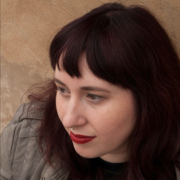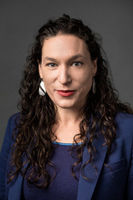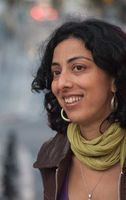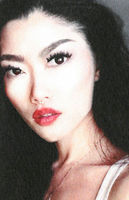"I Wanted to Write a Memoir About the Beauty and Tragedy of Reunion" Weston Non-Fiction Prize Shortlist Authors on Inspiration, the Highs of Non-Fiction & What Everyone Should Be Reading
Sponsored by former Lieutenant Governor of Ontario Hilary M. Weston since 2011, the Weston Writers' Trust Prize for Non-Fiction is awarded annually to a work of non-fiction which not only demonstrates a unique voice, but stands out among the landscape for it's narrative, tone, style, and technique. The five books shortlisted for the prize this year represented a satisfying and impressive array of Canadian literary talent, showcasing some of the best non-fiction to emerge from this country over the past year.
This year's finalists were Alicia Elliott, author of A Mind Spread Out on the Ground (Doubleday Canada); Anna Mehler Paperny, author of Hello I Want to Die Please Fix Me: Depression in the First Person (Random House Canada); Tanya Talaga, author of All Our Relations: Finding the Path Forward (House of Anansi); Ayelet Tsabari, author of The Art of Leaving: A Memoir (HarperCollins Canada), and Jenny Heijun Wills, author of Older Sister. Not Necessarily Related.: A Memoir (McClelland & Stewart).
We spoke with four of the five nominees (sadly, Tanya Talaga was unavailable for an interview) regarding the importance of honest discussion around mental health, the hidden joys of doing research, and breaking all the rules while writing a memoir.
To find out who won, be sure to visit our complete list of the 2019 Writers' Trust winners here
Open Book:
How did your nominated book begin for you? What drew you to your subject matter?
Alicia Elliott
It began with essays, each of which were attempts to answer a question or series of questions I had about myself and the world around me. I never knew where they would go or end up, but for me that's part of the fun of writing essays - following your curiosity to new and unexpected places.
Anna Mehler Paperny
My personal experience with depression and suicide drove both my interest and my motivation in chasing this book. There were so many questions I wanted answers to. And I felt there was a gap in the discourse: we have redemptive touchy-feely narratives, we have academic screeds, we have anti-psychiatry polemics. There was nothing in between, nothing that tackled this awful illness in an honest, skeptical, unflinching way.
Your CanLit News
Subscribe to Open Book’s newsletter to get local book events, literary content, writing tips, and more in your inbox
Ayelet Tsabari
I’ve started writing essays twelve years ago, at the same time that I started writing in English. Before that, in Hebrew, I’ve written fiction and as a journalist I wrote feature articles, but CNF was a new discovery to me. I didn’t really know what I was doing at the time nor could I conceive that this would become a book one day. I just knew I wanted to explore grief and how it had shaped me and my own journey of searching for home and reconnecting with my heritage and identity. With time, it became clearer to me that the essays I’ve been writing are thematically united and that there’s a clear narrative there. A lot of the work of shaping it into a cohesive book was done in revision.
Jenny Heijun Wills
I have been writing about transnational and transracial adoption for over a decade, but as a literary critic. The desire to write as a memoirist on the subject can possibly be traced back to that work too. I’ve read many adoptee life stories. Most of them follow a narrative trajectory charting an adopted person’s search for their first family. I wanted to write a memoir about the beauty and tragedy of reunion. What comes after the search. Few Korean adoptees of my generation make contact with family in Asia. Fewer still maintain a relationship. I wanted to tell this story with all the complex feelings I have about it: joy, anger, sadness, fear, and desire.
OB:
Where were you when you received news of your nomination? What was your reaction?
AE:
I was in bed with my husband and dog at about 7am, checking my email to try to encourage me to get up and start getting my son ready for school. I didn't want to wake my husband up because he'd been up late the night before, so I didn't scream or jump up and down externally - only internally. Seeing that my book was nominated alongside women whose work I admire so much, some of whom are friends, was very emotional for me. I immediately texted and/or emailed them so we could send congrats and a bunch of heart emojis to one another. Then I wiped my eyes, gave my Yorkie a belly rub and went to wake up my son.
AMP:
I was at home, getting ready to start my day. I am not a morning person so was kind of grumbly, and then opened Twitter and was agape. This was such incredible news to get, so validating and such an honour. I blurted the news to my dog Baloo, who was less than impressed. But that did not deter me.
AT:
I actually found out on Twitter! I saw that I got a notification from the Writer’s Trust and I saw Alicia Elliott’s handle there too so for some strange reason thought it was something to do with my credit for her head shot (which I’ve had the pleasure of taking). When I realized what I was reading I screamed a few times until my partner showed up, and then I cried, and then I paced around my apartment in disbelief. And then I called my mom.
JHW:
I heard about the nomination the same morning my book launched (September 17th), so I was in a hotel room in Toronto. Alicia texted me around six a.m. that we’d both been nominated. It was nice to hear about and to share in that excitement alongside her. I was still asleep and her text startled me awake, so my replies probably made no sense. Being nominated was completely unexpected and I was immediately awed at being recognized alongside writers I admire so deeply.
OB:
Is there a particular element of the non-fiction writing process that you find yourself most enjoying during book projects (whether research, writing, editing, discussing the finished book after publication, or otherwise)?
AE:
I'm a big nerd and chronic procrastinator, so I LOVE research. I love finding connections I never knew existed and figuring out ways to incorporate those connections into my work. Sometimes just reading about a topic deeply helps me develop the tone and structure of a piece. It's fun and unpredictable.
AMP:
Writing my deepest, most messed-up feelings felt good. But I think I enjoyed doing interviews the most - speaking to people who were experts in their field or who had gone through this mess themselves and translating that to book-prose. That was great and gratifying.
AT:
I love playing with structure and form. I’m in love with the lyric essay. Which is why the memoir-in-essays structure appealed to me. Generally, I love the idea of shaping a real life story into a narrative of meaning.
JHW:
Until now, all of my non-fiction writing was for scholarly audiences. What I enjoyed most writing a memoir is breaking grammatical rules, experimenting with style: repetition, lyrical voice, sound. That’s not to say that academic writing necessarily limits all creative liberties, but in Older Sister it felt natural to allow aesthetics to communicate a tone, a thought, a state of mind. This was so freeing. Not having to say everything outright. In fact, holding much back, and in doing so, saying something else—maybe (hopefully?) something more.
OB:
Tell us about a favourite non-fiction book you've read and would love to see others discover.
AE:
I will never stop recommending Lindsay Nixon's punk rock prairie NDN opus nitsinak (Metonymy Press). It's fresh, smart, innovative, rebellious. This book refuses to be put into a box or steer away from difficult questions, it challenges the reader, it shows how vulnerability can be strength. It's one I go to again and again to see how you can play with form and voice to invigorate tired CNF tropes. I love Nixon's work and can't wait to see what they do next.
AMP:
The Half Has Never Been Told (Basic Books), by Edward E. Baptist. Fascinating, illuminating look at the role slavery played in creating America’s economy.
AT:
I’ve been reading the other finalists and I’m enjoying their books tremendously. I’m also reading So You Want to Talk About Race (Seal Press) by Ijeoma Oluo. It’s so great! This book should be a required reading to anyone who’d like to understand systemic racism and how to have honest conversations about it.
JHW:
I recently read Chanel Miller’s Know my Name (Penguin Random House Canada) (but who hasn’t?). The opening words will stay with me forever. They are perfect. But so too will the ways she gestures to, from the very start, race and ethnicity. Because it is important also that people know those things and how her Asian womanhood was read (by her assaulter) and then erased (by the anonymity enforced by the legal system) and then reclaimed (in her memoir).
___________________________________________
For more information about the Weston Writers' Trust Prize for Non-Fiction, visit their website
Alicia Elliott is a Tuscarora writer from Six Nations of the Grand River living in Brantford, Ontario, with her husband and child. Her writing has been published by The Malahat Review, The Butter, Room, Grain, The New Quarterly, CBC, The Globe and Mail, Vice, Maclean's, Today's Parent and Reader's Digest, among others. She's currently Creative Nonfiction Editor at The Fiddlehead, Associate Nonfiction Editor at Little Fiction | Big Truths, and a consulting editor with The New Quarterly. Her essay, "A Mind Spread Out on the Ground" won Gold at the National Magazine Awards in 2017, and another of her essays, "On Seeing and Being Seen: Writing With Empathy" was nominated for a National Magazine Award in 2018. She was the 2017-2018 Geoffrey and Margaret Andrew Fellow at UBC, and was chosen by Tanya Talaga to receive the RBC Taylor Emerging Writer Prize in 2018. Her short story "Unearth" was selected by Roxane Gay to appear in Best American Short Stories 2018. Alicia is also presently working on a manuscript of short fiction.
Anna Mehler Paperny is an award-winning reporter for Reuters based in Toronto. She’s chased stories ranging from the opioid crisis to migration, from post-quake Haiti to Guantanamo Bay. She’s written for the Kingston Whig-Standard, the Edmonton Journal, the San Francisco Chronicle, Maclean’s Magazine, and has been a staff reporter at The Globe and Mail and a reporter-editor for Global News, where she developed globalnews.ca’s award-winning Investigative Data Desk. Her work on deaths in Canadian prisons won an RTDNA Dan McArthur Award for investigative journalism.
Ayelet Tsabari (איילת צברי) is the author of the memoir in essays The Art of Leaving. Essays from the book have won several awards including a National Magazine Award (silver) and a Western Magazine Award (gold). Her first book, The Best Place on Earth, won the Sami Rohr Prize for Jewish Literature and the Edward Lewis Wallant Award for Jewish Fiction. The book was a New York Times Book Review Editors’ Choice, Kirkus Review’s Best Debut Fiction of 2016, was nominated for The Frank O’Connor International Short Story Award, and has been published internationally to great acclaim.
Ayelet was born in Israel to a large family of Yemeni descent. She grew up in a suburb of Tel Aviv, served in the Israeli army, and travelled extensively throughout South East Asia, Europe and North America. In 1998 Ayelet moved to Vancouver, Canada, where she studied film and photography in Capilano University’s Media Program. She directed two documentary films, one of which won an award at the Palm Spring International Short Film Festival.
She wrote her first story in English in 2006.
A graduate of Simon Fraser University’s Writer’s Studio and the MFA Program in Creative Writing at the University of Guelph, Ayelet teaches at the University of King’s College’s MFA in Creative Nonfiction, at Tel Aviv University, and at the University of Toronto‘s School of Continuing Studies.
Jenny Heijun Wills was born in Seoul, South Korea and was adopted and raised in a white family in Southern-Ontario, Canada. In 2008 she reunited with her family in Asia. She's lived, studied, and worked in Toronto, Montreal, Boston, and Seoul and holds a PhD in English Literary Studies. She currently teaches at the University of Winnipeg in Manitoba.



